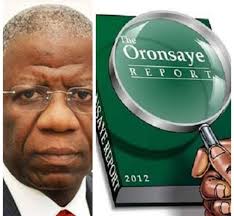
HOW POLITICS, LOBBYING DELAY IMPLEMENTATION OF ORONSAYA REPORT
Many Nigerians are curious as to why the government has not yet implemented the recommendations of the Oronsaye Report.
There are rumours of political manoeuvring and lobbying by some powerful individuals who stand to lose from the proposed merger of ministries, departments and agencies of government (MDAs).
Others speculate that the government may face logistical and financial challenges in the mergers. However, the delay is causing anxiety among civil servants and citizens alike, who are eager to see a leaner and more efficient government.
They say the government must provide clear and transparent communication on the progress of the mergers and address any concerns or obstacles hindering the implementation.
The Federal Executive Council (FEC) had approved the merging, scrapping, and subsuming of some MDAs in February this year in line with its policy of reducing the cost of governance.
The president’s special adviser on policy coordination, Hajiya Hadiza Bala-Usman, said the decision was based on the Steve Oronsaye Report on Civil Service Reforms inaugurated under former President Goodluck Jonathan’s administration in 2014.
According to the report, the Federal Radio Corporation of Nigeria will be merged with the Voice of Nigeria, while the National Commission for Museum and Monuments will be merged with the National Gallery of Acts.
The National Theatre will merge with the National Troupe of Nigeria, while the National Meteorological Development Centre will merge with the National Meteorological Training Institute.
National Agency for Control of HIV/AIDS (NACA) is to be merged with the Centre for Disease Control in the Federal Ministry of Health, while National Emergency Management Agency (NEMA) is to be merged with the National Commission for Refugee Migration and Internally Displaced Persons.
The Directorate of Technical Cooperation in Africa will be merged with the Directorate of Technical Aid to function as a department under the Ministry of Foreign Affairs.
Infrastructure Concession Regulatory Commission is to be merged with the Bureau for Public Enterprises. The Nigerian Investment Promotion Commission will merge with the Nigerian Export Promotion Council, while the National Agency for Science and Technology and Science and Engineering Infrastructure will merge with the National Centre for Agricultural Mechanisation and the Project Development Institute.
The special adviser further revealed that the National Biotechnology Development Agency will be merged with the National Centre for Genetic Resource and Biotechnology, while the National Institute for Leather Science Technology will be merged with the National Institute for Chemical Technology.
The Nomadic Education Commission will merge with the National Commission for Mass Literacy, Adult Education, and Non-formal Education.
The Nigerian Army University will be merged with the Nigerian Defence Academy to function as a faculty within the latter.
Similarly, the Air Force Institute of Technology also will be merged with the Nigerian Defence Academy to function as the faculty of the Nigerian Defence Academy.
The Border Communities Development Agency will be subsumed to function as a department under the National Boundary Commission.
The National Salaries Income and Wages Commission is to be subsumed into the Revenue Mobilisation and Fiscal Allocation Commission while the Institute for Peace and Conflict Resolution is to be subsumed under the Institute for International Affairs.
The Public Complaints Commission is to be subsumed under the National Human Rights Commission while the Nigerian Institute for Trypanosomiasis is to be subsumed into the Institute for Veterinary Research.
On the agencies to be relocated, Hadiza Bala Usman said the Niger Delta Power Holding Company is to be relocated to the Ministry of Power while the National Agricultural Land Development Agency will be relocated to the Federal Ministry of Agriculture and Food Security.
Meanwhile, a director in the Office of the Head of Civil Service of the Federation, who pleaded anonymity while speaking on the expiration of the 12 weeks given to the presidential committee to develop a workable plan for implementing the merger of MDAs, said it was wise to give the committee this week to see what they will come out with, since the deadline just expired.
Responding on whether he was aware of the preparedness of the MDAs for the merger, he said the Office of the Head of Service does not have such information, and that it is the Office of the Secretary to the Government of the Federation that is in charge of the merger because MDAs are under the SGF, not the Head of Service.
“The 12 weeks given to the presidential committee to implement the merger just expired, and today is Monday; you people should be patient and hold forth. Let us see what this week brings out. It is too early to ask what is happening.“On if the MDAs are prepared, I would not know how prepared they are, because MDAs are under the Secretary to the Government of the Federation. They are in charge of parastatals, not the Head of the Civil Service of the Federation,” he said.
 Premium News
Premium News